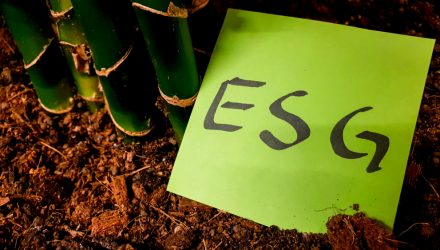ETFs adhering to environmental, social and governance (ESG) principles, including the FlexShares STOXX US ESG Impact Index Fund (CBOE: ESG) and its global counterpart, the FlexShares STOXX Global ESG Impact Index Fund (CBOE: ESGG), are increasingly part of the mainstream investment lexicon and that bodes well for the future of the asset class.
As more investors look to ESG investing strategies, one should compare how it is different from Socially Responsible Investing or Impact Investing and consider an ETF strategy to effectively integrate ESG into a diversified portfolio.
“At the start of 2020 I said that Environmental, Social, and Governance (ESG) investing would reshape the investment landscape in this new decade – but this phenomenon has been dramatically and irreversibly accelerated by the current situation,” said deVere Group CEO Nigel Green in a recent note.
ESGG is based on the STOXX Global ESG Impact Index, which screens companies scoring better with respect to a select set of ESG key performance indicators (KPIs), with the bottom 50% of such companies based on their ESG KPI scores excluded from the Index, as are companies that do not adhere to the UN Global Compact principles, are involved in controversial weapons or are coal miners.
ESG, ESGG Are Big Time Now
“Even before the start of the Covid-19 pandemic, ESG investments often outperformed the market and had lower volatility over the long-run,” said Green.
Performance data indicate the coronavirus is shining a light on the benefits of ESG funds.
During the first quarter, the returns of sustainable equity funds were clustered in the top halves of their respective categories, and more sustainable funds’ returns ranked in their category’s best quartile than in any other quartile,” according to Morningstar. “The returns of 70% of sustainable equity funds ranked in the top halves of their categories and 44% ranked in their category’s best quartile. By contrast, only 11% of sustainable equity funds finished in their category’s worst quartile.”
“What is perhaps more impressive is that those investments with robust ESG credentials are still typically continuing to outperform throughout the coronavirus-triggered stock market crashes where major indices were extremely volatile, with some plummeting 20 percent,” according to Green.
When covering ESG investments, the environmental aspect includes attributes like climate change, natural resources, pollution, waste management, and other environmental opportunities. The social aspect incorporates human capital, product liability, stakeholder opposition, and other social opportunities. Lastly, the governance aspect covers things like corporate governance and corporate behavior.
For more on multi-asset strategies, please visit our Multi-Asset Channel.
The opinions and forecasts expressed herein are solely those of Tom Lydon, and may not actually come to pass. Information on this site should not be used or construed as an offer to sell, a solicitation of an offer to buy, or a recommendation for any product.

